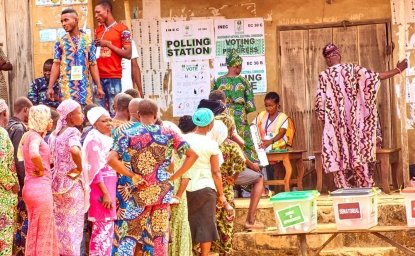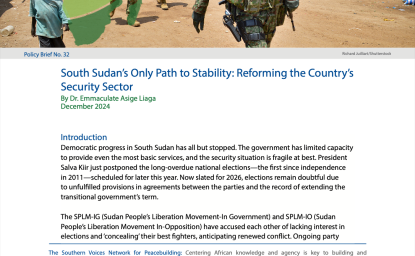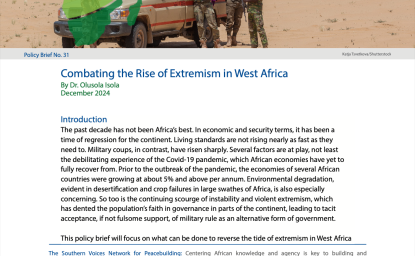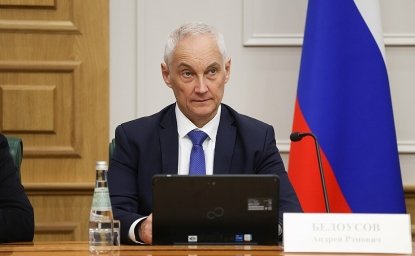THIS IS AN UNEDITED TRANSCRIPT
Hello, I'm John Milewski, and this is Wilson Center NOW, a production of the Woodrow Wilson International Center for Scholars. My guest today is an old friend, Robert Daly, director of the Wilson Center's Kissinger Institute on China and the United States, and as he does, joins us regularly to provide an update on the People's Republic of China.
And in this case, Robert, you just made a trip, your first post-pandemic trip back to China, spent, what, about three weeks there? I was there for three weeks. And then last week I was with a Chinese high level delegation in Colorado talking about the relationship under the new administration. So how important is it for you to spend time in China to do your work?
It's it's essential knowing we're getting close to knowing how people are really thinking, how they see China, how they see America, how they're talking about it is really my sole claim to a paycheck. There are plenty of people in Washington who look at China through a telescope, which is what I was doing during COVID and then make very certain declarations about the place.
Some of those declarations are correct, but they tend to miss the texture, the complexity of the place and the ways that the Chinese themselves are thinking. We've had a tendency over the past decade to reduce our view of China to the Communist Party and to reduce our view of the Communist Party to Xi Jinping himself. This of China studies becomes Xi Jinping studies.
Now, there are understandable reasons for that. COVID is one of them. But also, you know, the increasingly absolute power of the Communist Party and Xi Jinping status within it. He's the sole decision maker. But if you think back to when we've had stronger presidents. Any foreign analyst would have been more than wrong to have seen America only as that president and what they said and did.
You know here we know how much everything matters. The everything matters in China as well. So you've got to be there. What was you know, I know that you did this pre-election a couple of cycles ago speaking to how can you compare the two? Was the interest higher in the US election? What was the opinion about Donald Trump last time around?
They were trying him on for size for the first time. Right. What can you tell us? Well, a couple of things. First, the negative narratives about the United States are much more deeply ensconced in China now than they were. And they don't mean simple anti-Americanism. There is knee jerk anti-Americanism that comes from Chinese propaganda. I mean, anti-American narratives, beliefs that are held by people who think well and carefully about the United States, the sense that the United States, while still the world's most powerful nation, is declining, is fairly strong.
The sense that the United States is not interested in vast areas of the world, that China is interested in and active in Africa, Latin America, Southeast Asia, or Central Asia. That's very strong. And even with the economic crisis that China is now in the midst of, there's still a belief that China is rising as America weakens. That is, those are very deeply held views.
And that wasn't true the first time Donald Trump ran for president in 2016. As you noted, I did a long trip to China, then was giving Chinese language lectures during the period spanning both the Democratic and the Republican National Conventions simply talking about the system. So interested in the Hillary Clinton Donald Trump competition was high then, but not against this background of a belief in American decline.
So that's one of the big differences now. The other is that they feel, yes, that they know Donald Trump. They've been through this. They will not be surprised. They've been getting ready gaming it out. They fully expect to get hit by a train or punched in the face or whatever the right analogy is. You know, on the first day of the administration, you know, with higher tariffs and a resuscitation of the trade war, that they were not ready for the first time.
They're ready now. They would still rather it didn't happen. They're not going to like it, but they're ready. How has President Xi grown in the role of a world leader? You know, you mentioned the fact that China's interested in parts of the globe, or at least the Chinese perception is that they are that the US has forsaken or been distracted from.
I'm reading from Newsweek here, Robert, Peru gave Xi Jinping a warm welcome last week when he arrived for the Asia-Pacific Economic Cooperation summit in Lima. The Chinese leader was even accorded the honor of a state visit. Joe Biden, in contrast, got a barebones greeting as Air Force One landed. Peru then proceeded to treat the American president as if he were a backwater state, even making sure the humiliation was seen in public.
For instance, in the group photo of leaders attending the summit. She was standing in the place of honor to the right of the Peruvian president in the front row. Biden was placed in the back in the corner. America then what Americans sometimes call their backyard, is being disrespected. China on the other hand, looks ascendant, trading and investing its way into dominance of the region.
This is a commentary from Newsweek magazine. How, you know, how does this all factor into Xi's desire to be the major world leader? So that quote is largely true in its details. It is. China is not yet dominant in the region, but they're moving. And the trend line should be very concerning to us. One of the reasons that Xi Jinping got so much so it's such a good reception was that the Peruvian port of Chang K opening up north of Lima, a deep water port which could host military vessels as well as container ships, is opening up.
And that was a Chinese built will be a Chinese operated port. Xi Jinping is then going from Peru to Brazil, and he's building up a very strong relationship there, mostly based on trade, but it's broader than trade. This is a story not only of Chinese activity, but also of American neglect. China can bring so much wealth trade, investment, lending to these areas that it is going to be it may well be ascendant if the United States continues to deal with the region, deal with Africa, as it has.
China has now explicitly said that it should be the leader of the global South. Now, this is a little peculiar. You know, China is the world's second largest nation, so it's not clear that it is a part of the global South in any meaningful way. But it has a tradition going back to the Bandung conference of of seeing itself as aligned with the less developed or the developing world.
And they're now playing on that. They are using what they claim is America's instigation of the wars in Ukraine and Gaza as part of that. And they are making progress. It is uneven. It is speeding up in the Middle East. China is finding that it's a developmental state. Highly interested in technology under the leadership of the Communist Party is actually a very good match for the theocracies of the Middle East, which also want development, education and tech.
But under the hand of, you know, established parties, they're only getting started in the Middle East. And so we need to have a global view. We have to have and I would argue that the first Trump administrations and in some ways the Biden administration did not have a newly articulated convincing description of America's global role that the American people could support.
That has been a challenge for at least eight years, probably longer. And it remains a big challenge, I think, as we go into the new Trump administration. But when you look at the exit polls from the Justice completed US presidential election, immigration, the economy, number one, and number two by a significant margin and the economy maybe specifically inflation.
In the background of that, on the international scene, of course, Gaza loom large, particularly in Michigan and the ongoing conflict in Ukraine. When you were speaking to people in China, what are what's on their radar screen? What would be their exit poll issues that are dominating the conversation in China? It is, I think, the trade war. You know, how much worse is it going to get at a time when China is already somewhat hobbled for domestic reasons?
Technology restrictions on technology transfer, the export controls that we have put in place under the Biden administration to limit China's development of advanced computing and advanced chips is a big one, and those are areas in which they are quite fearful. They are preparing defenses. They have been decouple and de-risking their economy as we have been. They have been trying to sanctions proof their economy.
They have been very successful in finding new markets. And this is part of coming back to Latin America, part of what that is about. You know, the United States and Europe might not buy China's electronic vehicles, but they're relatively cheap, in part because the companies that make them don't profit from them, and therefore they can sell to Africa, to Latin America, to Southeast Asia and dominate those markets.
So they've been busy looking for alternate sources of supply and new markets for Chinese goods in preparation for a new trade war, which is largely centered around technology. They're more confident on the global order piece. They know that the United States will once again not really be active in Africa or Latin America, places where China is active. They know that they are making gains within the Middle East and they are looking for opportunities to drive wedges between the United States and its partners because they understand that Europe and Latin American partners in Northeast Asia are somewhat alarmed by the results of this election, that they that these countries, to American partners and allies worry about
tariffs. Worry in South Korea and Japan about demands that they pay more for American soldiers, military bases that that are in their countries. So China's looking for that. They're quite confident. On the global order front. They have a coherent narrative, a sense of the role they'd like to play in the world. They can't always do it. There are areas of non self-knowledge and incoherence here as well, and I think they underestimate some of America's remaining strengths.
But they're not sure that these are strengths that the Trump administration will value and so expect them to move even more aggressively on the global order front. Watch. Xi Jinping will give a speech at Davos in January, right before Inauguration Day, as he did in 2017, presenting China as the upholder of the current order and the provider of stability.
I want to circle back to the questions about the global order and China's role, but I first, I want to touch on what you said about technology and the trade war, potential trade wars. Does China see opportunities in areas like whether it be AI, where there has been fierce competition or climate related technological advances where China could claim to be the climate tech leader?
Or very shortly if Donald Trump, his second administration, is anything like his first administration as it relates to climate, well, it already claims to be the leader of the global green economy with with considerable justification, even though China remains the world's biggest emitter of greenhouse gases. That is true and will continue to be true for a long time.
But they're also, you know, for installed wind and solar capacity, for provision of solar panels to the world, that's actually that market is falling off for now. But it may be back. Lithium batteries, electronic vehicles. China is already leading the world and it is making that a part of its diplomacy, especially in what we now call the global South.
In the developing world, that's become it works for China not only economically, but it works for them diplomatically as a provider of global public goods. And so even though, as I say, they remain the world's biggest polluter and they're still burning a lot of coal and building coal power plants, they're the number one in installed nuclear capacity. So they have a pretty good series of talking points here.
And they are also no longer climate change deniers. There had been quite a bit of that in China in the early days, but the Chinese government is now all in and it will use that as part of its public diplomacy in countries that are already feeling devastating impacts of global warming. And it will be contrasting itself with the United States in on the global order front, we've seen in the last 24 hours what could be a dangerous escalation in Ukraine with a fierce attack from Russia, followed up by President Biden deciding that he will lift certain restrictions on the use of long range missiles fired from Ukraine toward Russia.
And now Putin has signed a new nuclear doctrine lowering the bar for Russia's ability to respond with nuclear weapons. Whereas China on this is going to insert himself into this. Is he going to keep this at arm's length? What we're trying to do, China will try to continue to have it both ways, to claim to be neutral and to claim to be a provider of peace, while in fact it is, as the Biden administration has said, an essential enabler of Russia through its purchases of Russian hydrocarbons and through its exports of drones and spare parts and, you know, processes to China.
So China is not neutral, but it is able to play part of a neutral party and potential peacemaker fairly well. Again, in the global South. Europe doesn't buy this. Northeast Asia, North America doesn't buy it, but much of the rest of the world does. China is also also understands that nuclear weapons are a growing part of US-China relations and of great power competition.
It makes a great deal and I heard a lot about this when I was in China just recently about China's no first use policy. And the United States does not have a no first use policy for good reasons, but for reasons that aren't immediately obvious to most people. Saying no first use policy seems like it would be sort of the default moral position.
America, because of its extended deterrence and other policies, it feels that it can't have a no first use policy. And so China, as the danger of, you know, nuclear weapons use, especially Ukraine goes up, is using that as one of its major talking points in public diplomacy around the world. So any involvement on the Middle East as far as the conflict will will she attempt to be a peacemaker or will he again try to have it both ways, as you put it?
China is having it both ways. When China within China tells the story of what's happening in the Middle East, they tend to begin either with pictures of victims of the war in Gaza civilians, or with footage of American aircraft carriers steaming toward the eastern Mediterranean. And their claim is that, as in Ukraine, this war comes about as a result of American hegemony.
And so they are hitting very us very hard with that and using the tying that to their lending through Belt and Road to get support for their position and votes in the United Nations, for example. But they don't get close enough. They don't pay any costs or take any risks such that if and when there are peace talks, they will want to sweep in and play a major role in that.
And if and when there is a rebuild of Ukraine or Gaza, they're going to be very interested to bring their, you know, world beating capacity in concrete and steel and aluminum to these projects and to where the hero hat there. But they remain you know, they retain that distance and they're not a player in the week to week, month to month diplomacy in the Middle East in part because that's very, very risky.
And they don't want to take those risks lining up a lot of style points that they may be able to cash in later. And and that can work. Yeah. You know, they are building up while working in some ways than the existing order and talking a lot about the importance of the United Nations as the center of a world order.
The United Nations, not the United States. They are also trying to set up alternate orders, alternate mechanisms that will give options to countries which like China, Russia, Iran and a growing number of countries throughout the world, don't want their choices shaped as they see it by the United States and its allies. So but they're doing that in a way that is sort of non-committal.
All things to all people and talking a big game on peace. So a final area I want to ask you about, Robert, for this discussion. Of course, we'll have others. As you've reminded us, this is not a short term story, Right. This is going to go on for decades. Yes or no, beginnings or endings. It's a continuum. Right.
But this is where we are today. And that area is a potential hotspot of Taiwan. And breaking news in the last 24 hours about pro-democracy, 45 pro-democracy leader sentenced to as much as ten years for their participation in an unofficial primary some months ago in Hong Kong. In Hong Kong. Right. Where does the where do we stand on on Taiwan and China and the US?
So the you know, regarding these new convictions in Hong Kong, these will only strengthen Taiwanese opposition to the offer that Beijing makes, which is one country, two systems. That's the country it makes to Taiwan. That is the offer it made to Hong Kong that now has no purchase in Taiwan. Even among the more moderate Guomindang party, there is some anxiety in Taiwan as we head into the new administration on a couple of fronts.
One is that President Trump has said that China, the Taiwanese company TSMC, Taiwan Semiconductor, which is the world's leading practically only maker of leading edge chips. President Trump has said that TSMC stole that industry from the United States, which isn't true, but which they see as a potential threat. There is also concern that while there are many fierce defenders of Taiwan and its ongoing de facto independence in the Republican Party and even in the new Trump administration, the president himself isn't necessarily among them.
And this was true in the first Trump administration as well that he, the president, was often put the brakes on some more hawkish members of his administration that wanted to go further in drawing closer to Taiwan and creating distance from from Beijing, Trump would say, no, you know, the game is actually China, you know, in dollar terms, certainly, and in power terms, not Taiwan.
Now, that attitude of President Trump's has both encouraging and somewhat worrisome trends depending on how things break down. I mean, he's he's not going to agitate on Taiwan, but Taiwan is also not sure that he won't make a deal that includes some diminishment of American support for them. And so this remains a big question mark. And this is a question about the administration generally.
When you have sort of a MAGA, somewhat isolationist America first impulse from the president, but you have a Republican Party and many strong supporters in that party of the president who remain American privacies, who want America to be the most important country in maintaining a global order. That is an evolution of the one we set up after World War Two.
How do those two different instincts play out? And Robert, where do you place President elect Trump's nominee for secretary of state, Marco Rubio, in that equation? He's been a very vocal China critic. Yes, but he's also an American primacy and I think and a believer in a strong American global role. There's no contradiction between being a strong critic of China and being a prime assist.
The question is, will there be a contradiction between being a pragmatist, which means cherishing and building alliances, providing global public goods, exercising global leadership, sometimes at a cost to America? Is there going to be any friction between that branch of American foreign policy and the Republican Party and what the president wants to do? And we don't know the answer to that yet.
Well, as the answers emerge, we'll talk about it again. Robert, as always, thank you. Thank you. We hope you enjoyed this edition of Wilson Center now and that you'll join us again soon. Until then, for all of us at the center, I'm John Milewski. Thank you for your time and your interest.












